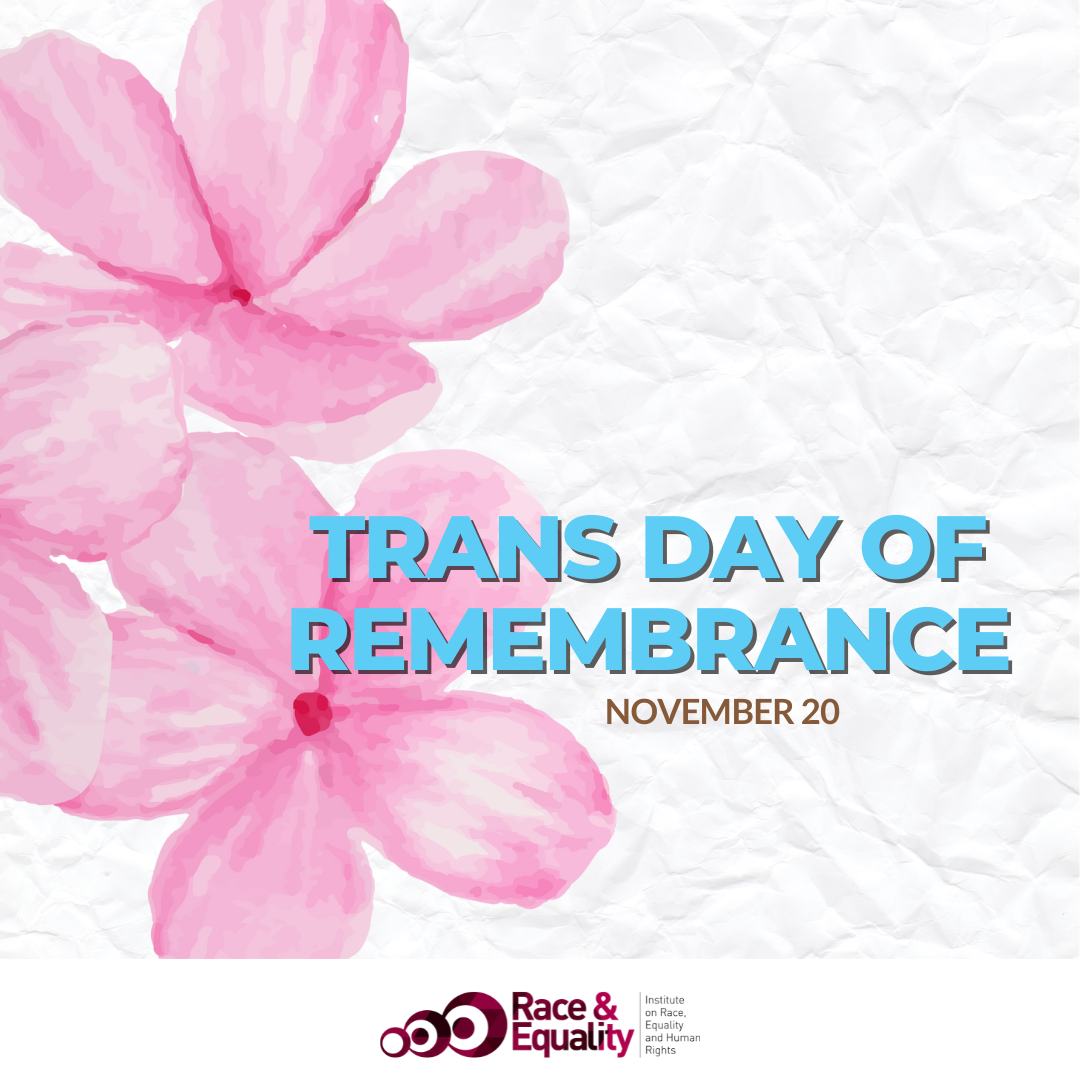Trans Remembrance: Colonialism and Trans Resistance
Trans and gender diverse persons are in a fight to recover their stories and build their memory. Colonialism has created a stigmatized and binary history of trans persons in Latin America.

Washington D.C., November 20, 2022 – Today, on Trans Remembrance Day, it is important to reflect on the memory of transgender and gender-diverse persons, their memory-building process, and the struggle to recover their stories and memories that were erased by colonialism. Therefore, the Institute on Race, Equality, and Human Rights (Race and Equality) joins in commemorating this date and asks various transgender and gender-diverse activists in Latin America about what colonialism represents in trans memory and how they reclaim their history.
The Independent Expert, Victor Madrigal-Borloz, recently presented the final report of his mandate focused on the impact of colonialism as one of the fundamental causes of violence and discrimination based on sexual orientation and gender identity (A/78/227), and how this has led to the creation of a stigmatized and binary memory of transgender populations in Latin America.
Latin American history is full of examples of how the region always preserves its memories and seeks new ways of remembering. In recent years, transgender and LGBTI+ persons, in general, have been fighting to recover, redefine, and remember their history. Furthermore, after armed conflicts and dictatorships that resulted in the erasure of human rights violations against the LGBTI+ persons, fulfilling this task of reclaiming memory takes us back to the beginning of the violent processes that stripped identities from many peoples during colonial occupation.
As the report indicates, colonization was a process of imposing systems of differentiation, hierarchy, and domination by a colonizing power over indigenous peoples. It also suggests that, after the decolonization process, a kind of continuation of the colonial project persists, which continues to discriminate against and harm transgender people. Before colonization, many communities did not use a binary gender approach or correlate anatomy with gender identity. Social hierarchies were not gender-dependent, and in certain communities, people had fluid gender identities, alternating between masculine and feminine roles. There were various sexual behaviors and gender expression fluidity, including homosexual relationships, transgender identities, and cross-dressing.[1]
As a result of colonialism spreading strict binary standards, gender identity-based violence plagues the region. Today, we see alarming figures from the Transgender Murder Monitoring (TMM) of Transgender Europe (TGEU), which indicates that between October 1, 2022, and September 30, 2023, there were 320 murders worldwide, of which 235 occurred in Latin America and the Caribbean.[2]
Bicky Bohórquez, from her experience as a Black transgender woman and activist for the Afro-descendant Foundation for Social and Sexual Diversities – Somos Identidad, mentions that the imposition of cis-heteronormative religiosity is one of the colonial manifestations that persist in Colombia.
“Religious conversion, the imposition of rigid gender binaries on colonized peoples, and the criminalization of sexual and gender diversity were strategies of colonial oppression,” as stated in the report, in line with Athiany Larios, a transgender feminist woman and human rights activist from Nicaragua, who says, “Colonialism is as relevant as ever. Many so-called experts and psychologists disqualify our feelings and label us as aberrant madmen with almost demonic ideas. We have been educated and taught under a misogynistic, macho, patriarchal scheme of what it means to be a man or a woman.”
In the case of Peru, although the artistry of the Moche and Chimu cultures depicted homosexual and affective behaviors as part of their daily lives, today, same-gender relationships in Peru are discriminated against.
One revealing aspect is that part of the repercussions left by colonialism—as stated in the Independent Expert’s report—is the acronym LGBTI, which cannot fully capture the diversity of sexualities and genders experienced by people in the sexual diversity community. Additionally, in some countries, laws like those used by colonial powers to impose binary gender norms are still in effect.
“We are nothing; they always censor us. When we look for jobs, they tell us there are none. And if they accept us, we have to dress as they say, as if God had brought us into this world. Personally, I disagree with the laws and the things that happen in this country regarding transgender persons. We, like everyone else, are human beings. We think, we have dreams, and desires to be heard,” says Carlos Hernández, a Cuban transgender man who coordinates the independent social project Por Siempre Trans.
In this regard, Race and Equality makes the following recommendations to States to respect and guarantee the rights of all transgender people:
- Adopt the necessary laws and policies to change the name and gender on official identification documents to ensure the recognition, respect, and inclusion of transgender and gender-diverse persons in line with the standards of Advisory Opinion 24/17.
- Systematically collect data on acts of violence and murders against transgender and gender-diverse persons, disaggregated by gender identity, sexual orientation, ethnic-racial identity, and age.
- Implement a public policy with a gender perspective in investigations into violence and murders against transgender and gender-diverse persons, respecting the individual’s chosen name, gender identity, and establishing guarantees of non-recurrence.
- Monitor and publicly penalize transphobic discourses reproduced in public and private institutions and in the media that promote discrimination and violence against transgender and gender-diverse populations.
[1] UN (2023). Report A/78/227. Available at: https://www.ohchr.org/en/documents/thematic-reports/a78227-protection-against-violence-and-discrimination-based-sexual
[2] Transgender Europe’s Trans Murder Monitoring (TMM) 2023. Available at: https://transrespect.org/es/trans-murder-monitoring-2023/

